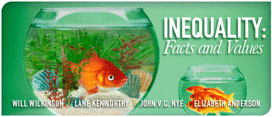I’m immensely grateful to professors Kenworthy, Nye, and Anderson for such thoughtful, challenging replies to my initial contribution. I could spend days responding in detail to each essay — and I probably will! I’d intended to write a relatively short omnibus post touching on one or two points in each of the reaction essays, but in the interest of getting the informal blog discussion under way, I’m going go ahead and post my response to each essay separately as soon as I finish it.
First up: Lane Kenworthy!
I have argued that consumption is a better proxy for material welfare than income and that the consumption gap has widened much less than the income gap, if it has widened at all. So, I conclude, inequality in material welfare has not increased much. Kenworthy argues that I’m overlooking the value of accumulated wealth. Money in the bank, he says, widens our horizon of opportunity and these opportunities are valuable to us even if we do not take advantage of them. I agree entirely. But I still believe that, among standard economic measures, consumption is the best indicator of individual’s or household’s real standard of living.
So what accounts for our disagreement? I’m not certain, but there seem to be two questions at issue. I think the fundamental question is: What are we trying to measure? The second question is: What’s the effect of savings on whatever it is we’re trying to measure?
I’ve been speaking variously, and probably somewhat carelessly, about “material welfare,” “real standard of living,” and “economic well-being.” Whether or not these terms mean precisely the same thing, I think people are generally talking about something along these lines when they’re talking about distinctively economic inequality. Whatever economic well-being is, it’s narrower and less comprehensive than overall well-being. Overall well-being might include such things as happiness, health, a sense of purpose, the development and exercise of certain human capacities, and more. I take it that specifically economic well-being has something to do with that part of overall well-being directly affected by the economic resources at our disposal, or at the disposal of our household. What we consider a sensible measure of economic well-being, then, is likely to turn on what we count as an economic resource and the weight we put on the various effects of these resources on our well-being.
So, for example, money in the bank, or in a mutual fund, is indisputably an economic resource. And I’m inclined to agree with Kenworthy that the peace of mind and sense of open opportunity that affords should be included in an accounting of economic well-being. But suppose I’ve invested a great deal in gaining skills greatly in demand in the labor market. Is my “human capital” an economic resource? Suppose I’ve got a stellar credit rating and so I could get access to a big line of credit with which I could do all sorts of things. My sense is that both human capital and reputational capital should count in much same savings does. I am, as a matter of fact, still in debt from graduate school. I certainly don’t worry about it, since I’m confident that I’ll come out way ahead in the end. But my “coming out ahead” is largely a matter of future consumption — a matter of what I expect to do with the money I’ll make. And it seems to me that the expectation of future consumption is a large part of the value of savings, or of the value of access to credit. So, while current consumption may be a bit misleading as a measure of an individual’s or household’s current economic well-being, aggregate measures that encompass people at all points of the life-cycle seem to me pretty likely to capture much of the value of savings, access to credit, and so on.
That said, I think nominal consumption remains a pretty rough measure of economic well-being. For example, the quality of public goods in a place certainly contributes to the standard of living of the people who live there. The quality of public goods and services here Iowa City is excellent — much better than in Washington, D.C. Public schools in Iowa are remarkably good. (Iowa consistently has one of the highest high-school graduation rates and one of the highest average standardized test scores in the United States, which is really remarkable when you think about it.) Basic cost-of-living issues aside, it seems pretty clear that both income and consumption measures badly underestimate the level of real consumption enjoyed most Iowans — especially low-income Iowans. Meanwhile, low-income Washingtonians likely have it rather worse than consumption surveys would indicate. It might be interesting to talk a bit how social scientists could correct for this sort of thing in their estimates of economic inequality.

